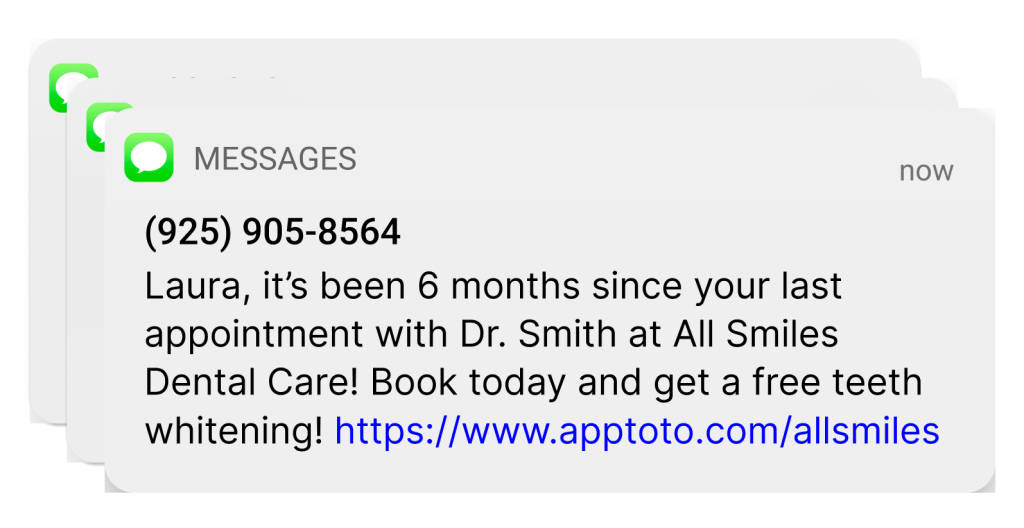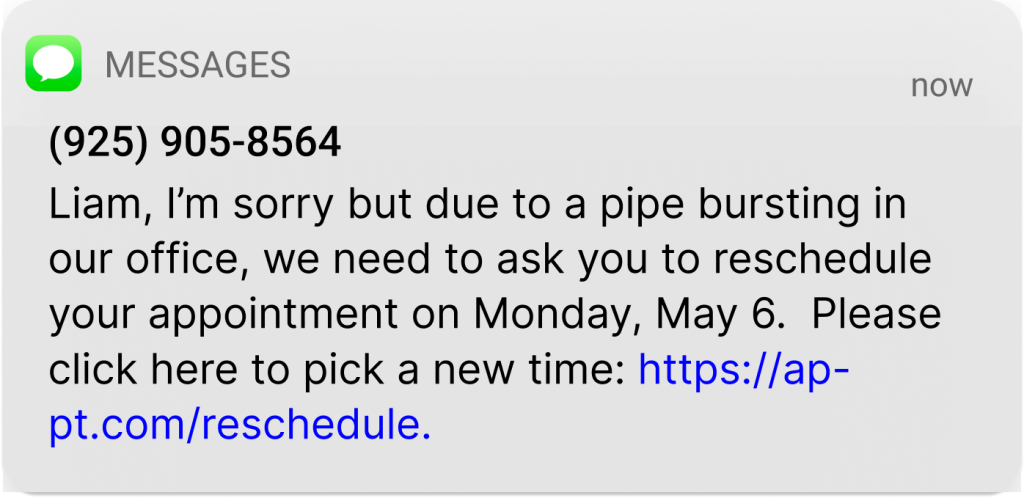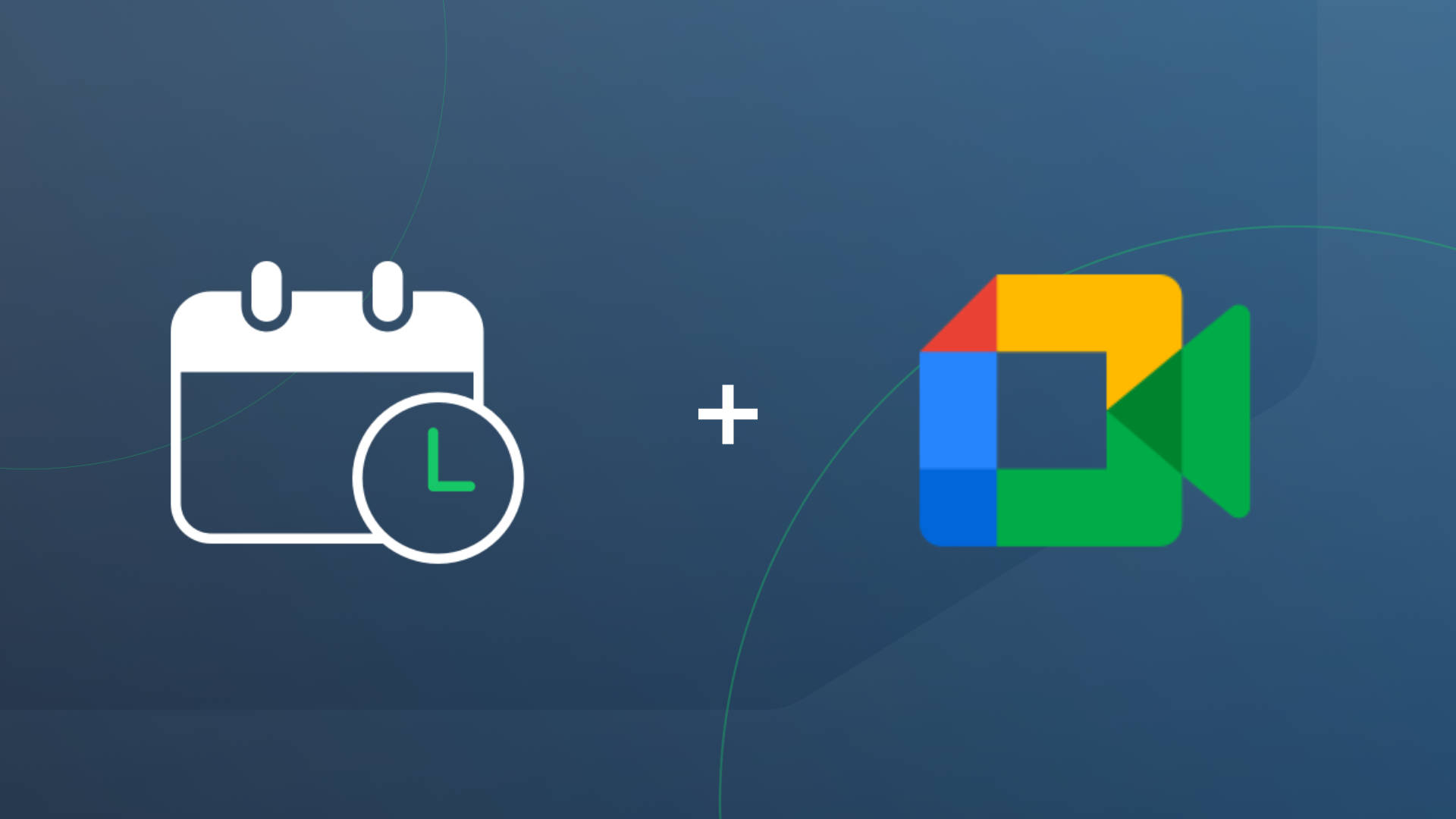Estimated reading time: 6 minutes
Maximizing your client communication strategy means knowing when to use the right tools for the job.
If you’re an Apptoto user, you recognize how valuable appointment reminders are in reminding clients about upcoming appointments and preventing no-shows. But there are other ways you may want to connect with clients (outside of reminders)—whether that’s to send a quick “heads up” about their upcoming visit or entice them to book a new service they’ve never used before.
Campaigns and Message Blasts both help you communicate with clients, but they serve different purposes. Campaigns are your long-term game plan, sending automated messages to keep clients engaged and booking appointments over time. Message Blasts are your quick-hit solution for immediate announcements and urgent updates. Learning to use these two powerful tools can elevate your client outreach, drive more bookings, and build stronger relationships.
What is the Difference Between a Campaign and a Message Blast?
Campaigns and Message Blasts are fantastic ways to connect with a large group of people with targeted bulk messages.
Campaigns

A Campaign is a tool for sending automated SMS and email messages to target clients over a period of time. You can send Campaign messages to people based on a calendar event (such as the date of the client’s last appointment) or an Address book (VIPs or a targeted lead list).
With Campaigns, you might send a large batch of messages upfront when you launch the Campaign to your targeted audience. But Apptoto can also recognize if a previously non-enrolled contact suddenly meets the criteria of the Campaign audience and enroll them into the sequence even after the campaign has launched. As a result, Campaigns can be set up once and run in perpetuity.
As part of a Campaign, you might send a combination of several messages (both SMS and email) over days or weeks. Although Campaigns can be used in many ways (e.g., promote specials, educate clients, etc.), typically, the goal of an Apptoto Campaign is to get a prospective or current customer to book an appointment. Campaigns can track who amongst your targeted audience hasn’t booked an appointment and send them messages until they do.
Common Use Cases for Campaigns
- Marketing/Promotional Campaigns: Targeted messages tailored to client preferences, past services, or behavior. These messages may offer a special deal or discount. Typically, the goal is for the receiver to schedule or purchase a new service or product.
- Booking Campaigns: Booking campaigns aim to drive prospective or current customers to book a new appointment with you. Often, clients are targeted based on the date of their last appointment (e.g., six months ago for a dental patient) or on client status (e.g., a VIP financial advising client needs to book their 2025 planning call)
- Follow-Up or Feedback: Scheduled follow-up messages after appointments to collect feedback, solicit reviews, or provide next steps.
Message Blasts

Message Blasts are one-time bulk messages sent to a targeted group of people. While Campaigns offer sustained engagement over time, Message Blasts are ideal for immediate or time-sensitive announcements. While Message Blasts are typically only thought of as SMS text messages, they can also include emails and calls.
Because Message Blasts are delivered once, the audience is firmly set. You cannot add new people to the blast after the fact; instead, you must create a new Message Blast. Like Campaigns, you can use Message Blasts to promote a special offer or drive new appointment bookings; however, Message Blasts are also helpful in quickly delivering critical information to clients. There may not be a goal other than to inform your customers (e.g., office closure, sick provider needs to cancel today’s appointments).
Common Use Cases for Message Blasts
Message Blasts are perfect for delivering urgent or one-time communications to a group of clients. They are commonly utilized for:
- Urgent Announcements: Emergency closures, last-minute changes, or critical updates that require immediate attention.
- Reschedule Requests: Day-of or day-before requests to reschedule appointments due to unforeseen issues (e.g., staff sickness)
- Seasonal Promotions: Holiday greetings, one-time special offers, or limited-time discounts to boost engagement and revenue.
- Event Invitations: Inviting clients to attend special events, workshops, or seminars for enhanced client interaction.
Benefits and Limitations of Campaigns and Message Blasts
Campaigns offer the benefits of automated and targeted messaging, saving time and effort in manual outreach. However, they require more strategy and setup than a single Message Blast and may not be suitable for urgent communication needs.
On the other hand, Message Blasts provide immediate communication to a group of clients with quick setup but lack ongoing engagement and customization compared to Campaigns. It’s essential to use Message Blasts when needed (but also sparingly) because you risk overwhelming or frustrating your clients if you send them too frequently.
Best Practices for Utilizing Campaigns and Message Blasts

Businesses should consider the following to maximize the effectiveness of both features:
- Tailoring Messaging Content: Craft personalized messages for better client engagement. Include dynamic fields to incorporate the client’s unique information and preferences in the message when possible.
- Monitoring and Adjusting Campaigns: Review campaign performance regularly and make necessary adjustments to improve response rates. Adjust message content, timing, or calls to action as needed.
- Segmenting Client Lists: Organize clients into groups for targeted messaging based on their preferences, behavior, demographics, appointment status, etc.
- Timing and Frequency: Determine the best times and frequency for sending messages to ensure maximum impact. (Hint: Apptoto found 6 P.M. is the best time to send text messages, 3 P.M. for phone calls, and 5 A.M. for emails)
- Consent: Collect your clients’ consent before sending them marketing text messages. Give clients the option to opt in or out of bulk messages and choose their preferred communication mode (call, text, or email)
Elevating Client Relationships with Campaigns and Message Blasts
Your business’s communication needs and client expectations will determine when Campaigns or Message Blasts are more appropriate. Campaigns offer long-term, tailored engagement, while Message Blasts rapidly disseminate important information to a broad audience. By understanding the strengths and limitations of each tool, companies can enhance their client outreach strategies, drive more bookings, and build more loyal and long-lasting client relationships.
Put Message Blasts and Campaigns to work for your business with a free 14-day trial. Do you still have questions? Connect with our expert Customer Support team to learn more.




